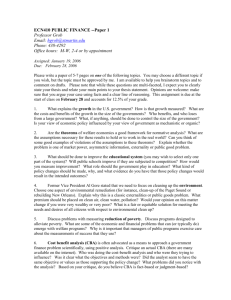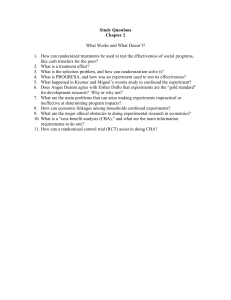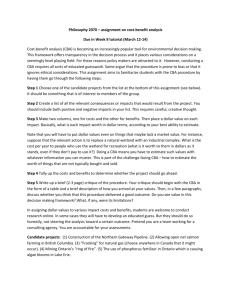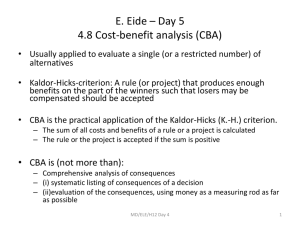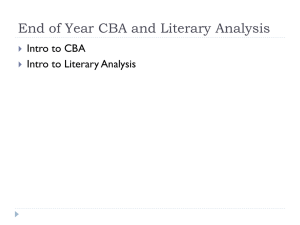CBA (1) Promote development of transferable learning & verbal skills characteristic... (2) Document the development of those skills.
advertisement
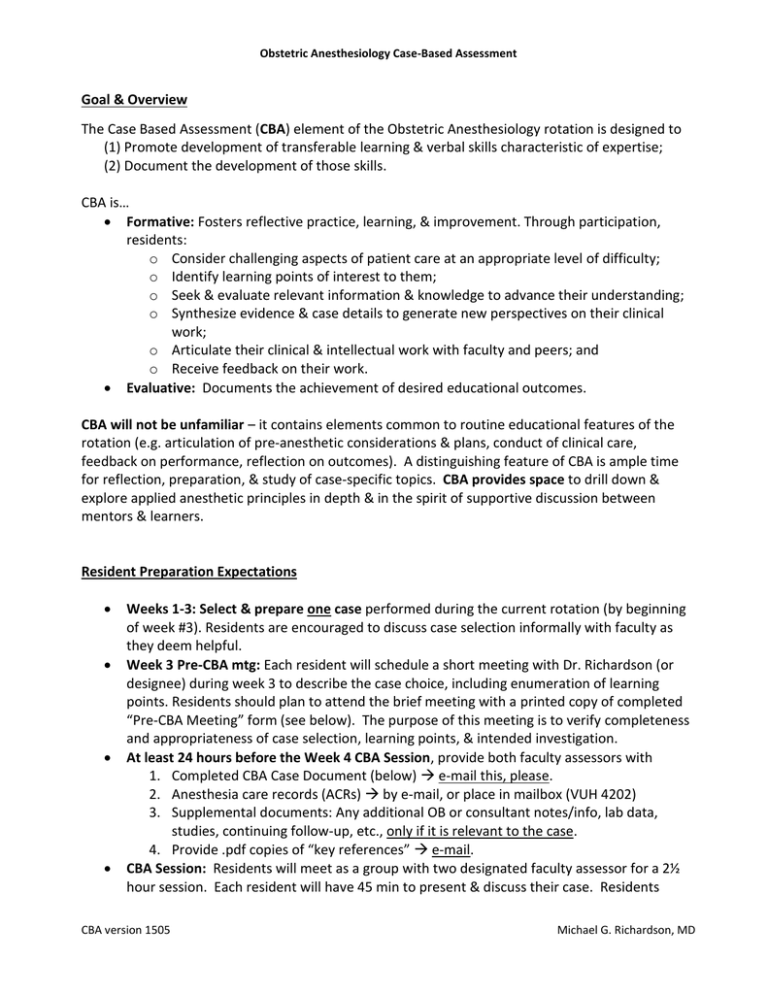
Obstetric Anesthesiology Case-Based Assessment Goal & Overview The Case Based Assessment (CBA) element of the Obstetric Anesthesiology rotation is designed to (1) Promote development of transferable learning & verbal skills characteristic of expertise; (2) Document the development of those skills. CBA is… Formative: Fosters reflective practice, learning, & improvement. Through participation, residents: o Consider challenging aspects of patient care at an appropriate level of difficulty; o Identify learning points of interest to them; o Seek & evaluate relevant information & knowledge to advance their understanding; o Synthesize evidence & case details to generate new perspectives on their clinical work; o Articulate their clinical & intellectual work with faculty and peers; and o Receive feedback on their work. Evaluative: Documents the achievement of desired educational outcomes. CBA will not be unfamiliar – it contains elements common to routine educational features of the rotation (e.g. articulation of pre-anesthetic considerations & plans, conduct of clinical care, feedback on performance, reflection on outcomes). A distinguishing feature of CBA is ample time for reflection, preparation, & study of case-specific topics. CBA provides space to drill down & explore applied anesthetic principles in depth & in the spirit of supportive discussion between mentors & learners. Resident Preparation Expectations Weeks 1-3: Select & prepare one case performed during the current rotation (by beginning of week #3). Residents are encouraged to discuss case selection informally with faculty as they deem helpful. Week 3 Pre-CBA mtg: Each resident will schedule a short meeting with Dr. Richardson (or designee) during week 3 to describe the case choice, including enumeration of learning points. Residents should plan to attend the brief meeting with a printed copy of completed “Pre-CBA Meeting” form (see below). The purpose of this meeting is to verify completeness and appropriateness of case selection, learning points, & intended investigation. At least 24 hours before the Week 4 CBA Session, provide both faculty assessors with 1. Completed CBA Case Document (below) e-mail this, please. 2. Anesthesia care records (ACRs) by e-mail, or place in mailbox (VUH 4202) 3. Supplemental documents: Any additional OB or consultant notes/info, lab data, studies, continuing follow-up, etc., only if it is relevant to the case. 4. Provide .pdf copies of “key references” e-mail. CBA Session: Residents will meet as a group with two designated faculty assessor for a 2½ hour session. Each resident will have 45 min to present & discuss their case. Residents CBA version 1505 Michael G. Richardson, MD Obstetric Anesthesiology Case-Based Assessment should prepare for this simply by being very familiar with their cases, so that discussion can focus on details of essential issues. Criteria for Assessment Punctuality: Timely delivery of case documents; appears at scheduled time. Documentation: All case materials; completeness; Discussion: o Depth of familiarity with case details; o Command of underlying principles; o Understanding of relevance of systems issues contributing to patient outcomes; o Communications skills – clear & organized; o Insightful lessons-learned and/or improvement ideas. Assessment Session: 45 minutes will be devoted to presenting & discussing the case in an interactive manner. Final minutes are spent providing the resident with feedback. On occasion, the faculty assessors will request a brief follow-up on a subsequent day. Assessors will complete & provide you with the 2-page written assessment form below. Ask: N.B.: Although this is a formal assessment, it is designed to promote success for each resident, through a supportive environment of guidance & ample opportunity to solicit guidance, both during clinical days and during every 3rd OBEd days. If any of this is unclear, or if you have difficulty with any aspect, simply ask. CBA version 1505 Michael G. Richardson, MD Obstetric Anesthesiology Case-Based Assessment Pre-CBA Meeting Resident Name: ________________________________ Date: ____________________ Case Synopsis (1-2 sentences): Intended Main Learning Points, including: Issue: Brief description (can be as little as a sentence, or less) of issue/learning point that you intend to explore/research; Questions to Explore: Brief description of specific questions you want to answer regarding each issue. Description of things you might consider adjust in the future, or your recommendations to other individuals, or for system changes, that may contribute to enhanced safety or better patient care. Example: Issue: Large / repeated doses of uterotonic drugs were used in this severe post-partum Faculty notes: hemorrhage case. Questions to Explore: At what point is maximal benefit achieved? Does 80 units of Pitocin over 30 minutes make sense? Any dangers in such large doses? When should we abandon medical therapy and move to surgical intervention? Is IV methergine acceptable in certain circumstances? Compare to IM? Include at least 3 & not more than 5. At least one must be an issue related to communication, teamwork, or systems issues. Issue #1: Faculty notes: Questions to Explore: Issue #2: Faculty notes: Questions to Explore: Issue #3: Faculty notes: Questions to Explore: Issue #4: Faculty notes: Questions to Explore: Issue #5: Faculty notes: Questions to Explore: CBA version 1505 Michael G. Richardson, MD Obstetric Anesthesiology Case-Based Assessment Resident Name: ________________________________ CA: 1 2 3 Date: ____________________ Case Synopsis (detailed, yet succinct): Main Learning Points (in order of descending importance/interest to you). Include: Issue: Description (in paragraph form) of issue/learning point, combined with what is known from relevant evidence; References: List the refs you consulted. Include 1-3 “key references” that you found particularly valuable; Lessons Learned: Description of things you might consider adjust in the future, or your recommendations to other individuals, or for system changes, that may contribute to enhanced safety or better patient care. Issue #1: Key Reference(s): References: Lessons Learned/ Improvement Ideas: Issue #2: Key Reference(s): References: Lessons Learned/ Improvement Ideas: Issue #3: CBA version 1505 Michael G. Richardson, MD Obstetric Anesthesiology Case-Based Assessment Key Reference(s): References: Lessons Learned/ Improvement Ideas: Issue #4: Key Reference(s): References: Lessons Learned/ Improvement Ideas: Issue #5: Key Reference(s): References: Lessons Learned/ Improvement Ideas: CBA version 1505 Michael G. Richardson, MD Obstetric Anesthesiology Case-Based Assessment CBA Assessment – Page 1 Resident: _______________________ Assessor: ______________________ Assessment Date: ______________ CA-1 CA-2 CA-3 CBA # 1 2 3 Documentation: Delivery (e-mail) on time: Yes ( 24 hrs in advance) No (<24 hrs in advance) Complete? Yes, all elements Missing Some Important Elements or Data Evidence/References: Relevant & Substantial Insufficient Relevance or Insubstantial Learning Points: Focused Too General/Superficial Insubstantial Substantive Key Points Identified Missed Some Key Points Presented knowledgeably, authoritatively Read from text; lacking full command of material Clear & Organized Lacked clarity or organization Discussion: Oral Presentation: Demonstrated Deep Understanding of … Case Details: Consistently Mostly Partially or Insufficiently Directly Related Underliying Priniciples /Issues: Consistently Mostly Partially or Insufficiently Indirectly Related Principles/Issues: Consistently Mostly Partially or Insufficiently Alternative Interventions, Pros/Cons: Consistently Mostly Partially or Insufficiently Systems/ Team/ Communication Issues: Consistently Mostly Partially or Insufficiently Yes! Mostly Partially or Insufficiently Concluded with Substantive / Insightful Learning Lessons: Overall Assessment: CBA version 1505 Exceeds T-L* T-L* Appropriate Below T-L* (*T-L = Training-Level) Michael G. Richardson, MD Obstetric Anesthesiology Case-Based Assessment CBA Assessment – Page 2 Resident: ________________________ General Comments: Specific Strengths: Suggestions for Improvement: Assignments / Follow-up (if necessary): CBA version 1505 Michael G. Richardson, MD
